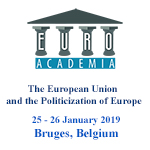Euroacademia Conferences
 Europe Inside-Out: Europe and Europeanness Exposed to Plural Observers (9th Edition) April 24 - 25, 2020
Europe Inside-Out: Europe and Europeanness Exposed to Plural Observers (9th Edition) April 24 - 25, 2020 Identities and Identifications: Politicized Uses of Collective Identities (9th Edition) June 12 - 13, 2020
Identities and Identifications: Politicized Uses of Collective Identities (9th Edition) June 12 - 13, 2020 8th Forum of Critical Studies: Asking Big Questions Again January 24 - 25, 2020
8th Forum of Critical Studies: Asking Big Questions Again January 24 - 25, 2020 Re-Inventing Eastern Europe (7th Edition) December 13 - 14, 2019
Re-Inventing Eastern Europe (7th Edition) December 13 - 14, 2019 The European Union and the Politicization of Europe (8th Edition) October 25 - 26, 2019
The European Union and the Politicization of Europe (8th Edition) October 25 - 26, 2019 Identities and Identifications: Politicized Uses of Collective Identities (8th Edition) June 28 - 29, 2019
Identities and Identifications: Politicized Uses of Collective Identities (8th Edition) June 28 - 29, 2019 The European Union and the Politicization of Europe (7th Edition) January 25 - 26, 2019
The European Union and the Politicization of Europe (7th Edition) January 25 - 26, 2019 7th Forum of Critical Studies: Asking Big Questions Again November 23 - 24, 2018
7th Forum of Critical Studies: Asking Big Questions Again November 23 - 24, 2018 Europe Inside-Out: Europe and Europeanness Exposed to Plural Observers (8th Edition) September 28 - 30, 2018
Europe Inside-Out: Europe and Europeanness Exposed to Plural Observers (8th Edition) September 28 - 30, 2018 Identities and Identifications: Politicized Uses of Collective Identities (7th Edition) June 14 - 15, 2018
Identities and Identifications: Politicized Uses of Collective Identities (7th Edition) June 14 - 15, 2018
Papers
The Role of Foreign Correspondents in Cultural and Science Diplomacy
With the European Union in general and different European countries in particular maintaining a strong focus on cultural diplomacy initiatives, it is imperative to explore how foreign correspondents covering art and culture as well as those initiatives affect the perception of the European Union and its member states to audiences abroad. The following research question then is explored: How do foreign correspondents shape the image of a foreign country or a multinational institution such as the EU to home audiences, particularly through coverage of art and culture and cultural diplomacy activities?Propaganda or Cultural Diplomacy? Tarabya Cultural Academy
This paper debates the Tarabya Cultural Academy, a culture and art institution initiated in 2011 by the then foreign ministers of the Federal Republic of Germany and Turkey. Its original purpose was to bring German and Turkish publics together, and create understanding between the two states. This paper will therefore debate Tarabya Cultural Academy, its artistic work and the blurred line between cultural diplomacy and propaganda in this context, focusing on specific artwork that has been created over the last two years (2016 – 2018).Politicization of Europe without the Peoples of Europe?
The mentions of the “peoples” of Europe can be seen as just another way of referring to the different sets of citizens, but we will defend that this persistence in the use of the word is related to recognizing that the political construction of Europe can’t neglect Community factors and that, in any case, that construction will not succeed if these factors are neglected.Jürgen Habermas: The “Unfinished” European Project and the Claim of Solidarity
The paper highlights the concept of solidarity in Habermas’ most recent writings (2013-2015) on the European crisis, meant as a key-factor in order to solve it. The idea of political and civic solidarity, heir of the republican notion of fraternité, may fit into a transnational context such as Europe, because it specifically concerns stranger citizens in terms of morality and identity.Justice for Europe
The purpose of this proposal is to present Jacques Derrida’s reflections on Europe, demonstrating that deconstruction does not remain enclosed in speculative discourses, but aspires to intervene in the world. In this “time of poverty” in which millions of people are knocking on the doors of Europe, it is our ethical and political responsibility to negotiate between the European imperatives of hospitality and the need for unconditional hospitality in every case.Measure and Limit: Thinking of Europe at the Meridian
This paper proposes the thesis that the philosophical idea of Europe includes in itself the concepts of Measure and Limit, which represent the relationship to the ‘otherness’, as is symbolically shown by the permeability of the Mediterranean sea and earth. The main philosophical and political responsibility of Europe doesn’t consist of the integration of its oceanic (Nordic) and Mediterranean (Southern) countries, but of measuring its differences and building bridges between the islands of its archipelago.The Public Realm and Contemplation in the Thought of Hannah Arendt and Jan Patočka
Arendt and Patočka address history, philosophy, and the crisis of modern Europe with similar influences (chiefly Heidegger) and method, yet their understanding of how contemplation relates the European ideal of the public realm is incongruent. This paper will explore their points of divergence in order to gain insight into the threat they believed the European ideal of the public realm was facing in the 20th century.Inequality, Macroeconomic Performance and Political Polarization: An Empirical Analysis
The political gridlock may explain why economies experience slow recoveries from recessions and financial crises. This Paper investigates the determinants of political polarization with special focus on income inequality.The Policy-Mix In the Euroland – Challenges at the End of the Post-Crisis Cycle
This paper applies standard econometric tools in order to assess the policy-mix in the Euroland over the past two decades, with a focus on the post-crisis cycle.Monetary Policy at the Zero Lower Bound: The European Central Bank in the Realm of Politics
This paper reviews how the ECB’s exceptional monetary accommodation to fight persistent low inflation during 2013-2018 may trigger political intervention and a populist backlash.



